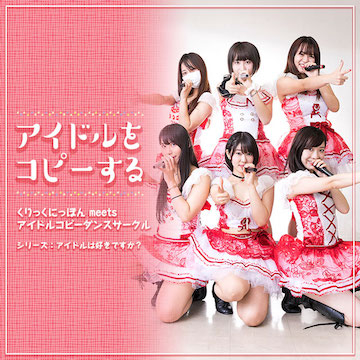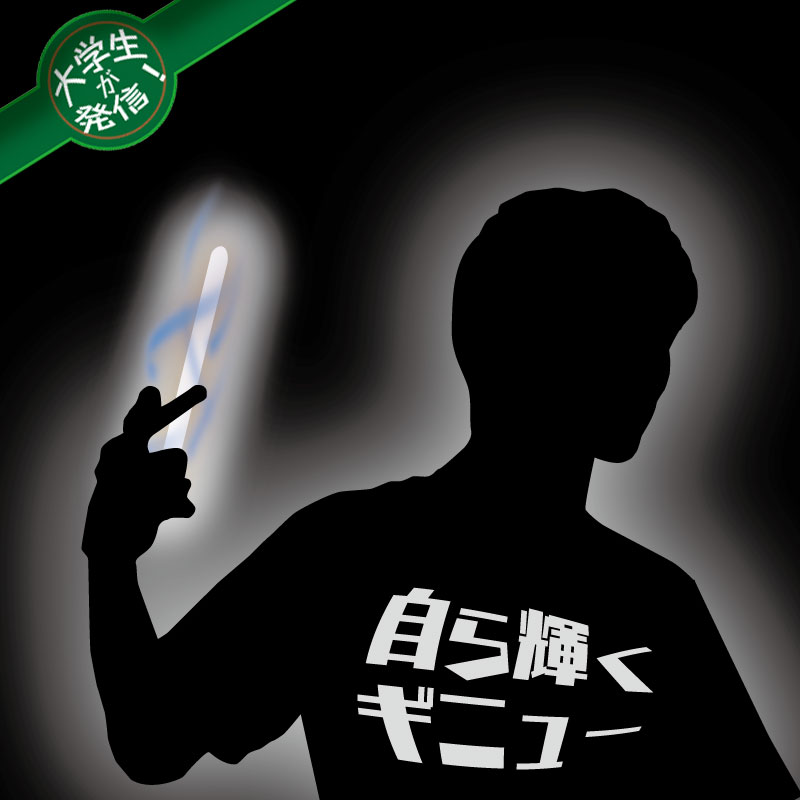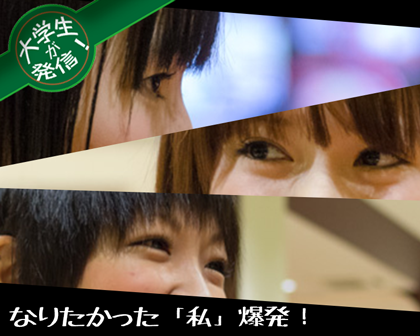Do You Like “Idols?”
vol.3
Idols and Fans and Academics
Daisuke A senior in college, Daisuke is studying the relationship between the trajectory of an idol’s popularity and their age. Misaki A college junior who once belonged to a talent agency and has experience as an idol, Misaki is an aspiring actress. Her research concerns how various idol groups capture their fan base.
2013.02
 We at TJF have collaborated with a seminar class at Meiji University's School of Global Studies that aims to rediscover and share captivating aspects of Japan with the world.
We at TJF have collaborated with a seminar class at Meiji University's School of Global Studies that aims to rediscover and share captivating aspects of Japan with the world.
Students taking the seminar split up into two groups, with one looking into the question, "Do you like idols?" and the other on "Expression through decoration."
A comment from the students:
A number of our requests for interviews were turned down, and had a lot of trouble securing interviewees. Even when people agreed to speak to us, they had busy schedules and we found it difficult to set up appointments.
Related link:
Being All That We Want To Be
Idols and Fans and Academics
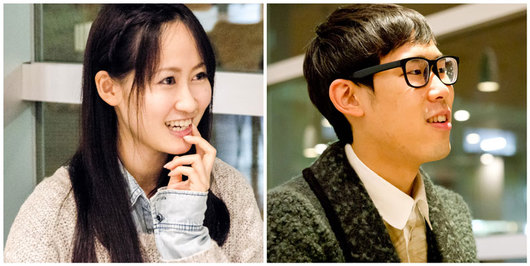
Why are "idols" -- cute media personalities in their teens and twenties who sing and dance -- so popular? This is the very question some college students are pursuing in their studies. Two students who research idols for their graduation thesis talk about idols and their fans.
|
Profile Daisuke Misaki |
Q:So both of you are writing your graduation thesis on idols.
Daisuke:Yes. I'm writing about the relationship between idols' popularity and their age. The age range of idols has broadened in recent years. For example, the oldest member of the increasingly popular group Idoling!!! is 24, with the youngest at 13. Shinoda Mariko, of AKB48is 26... There's probably a big difference between the appeal of a 13-year-old and that of a 26-year-old. My research started with questions I had about whether there's an "appropriate" age for idols, and what "idol-ness" means in the first place, and whether that has any relation to age.
- Idoling!!! official website:http://idoling.info/
- AKB49 official website:http://www.akb48.co.jp/
- Mariko Shinoda.net:http://mariko-shinoda.net/
Q: What specifically are you looking into?
Daisuke:I'm mapping out the ages of various idols, focusing on the participants in the August 2012 Tokyo Idol Festival that was held in the Odaiba district. The annual event, which began in 2010, has grown in size every year, with some 700 idols from over 100 groups appearing in 2012. When I looked up the ages of the participating idols, once past the age of 20, there are fewer and fewer of them--as I'd expected. Looking at a lot of data, it appears that 20 is around the age idols start to think about whether they want to keep on being idols. I want to delve more deeply into issues like that.
Q:What is an "idol?" Is there a definition?
Daisuke:That's a really difficult question, especially since the word "idol" is used in so many contexts. I mean, one could even call a pretty girl in the neighborhood an "idol" of sorts... In terms of show business, there's the question of whether Matsuda Seiko still constitutes an "idol" at her age. What do you think?
* Matsuda Seiko debuted in the 1980s as a female idol and gained overwhelming popularity.
- Matsuda Seiko's blog:http://www.seikomatsuda.jp/jp/
Misaki:Different people have different definitions, and I think that's fine (laughs). When you start thinking about it, you come up against questions like, are popular bands idols, too? I've defined for myself that idols are people who dance and sing.
Q:Tell us about your research, Misaki.
Misaki:I'm interested in the different ways that "shimai unittto" (literally "sister units") attract fans. There's no clear-cut definition for what a "sister unit" is, but when talent agencies are trying to launch new idol groups, they sometimes create two groups with similar tastes and characteristics but different age ranges, calling one the "older sister" group, and the other the "younger sister" group, and bring them out as a set.
As an example, I've been looking at the differences between PASSPO☆, whose members are all high school students or younger, and predia, whose members are 20 and older.
- PASSPO☆ official website:http://passpo.jp/
- predia official website:http://predia-party.jp/
Misaki:In Japan, younger idols tend to be more popular, with idols' popularity suddenly dipping as they get older. So I came up with the hypothesis that "older sister" idols probably establish a clear concept behind their act to secure fans. But this hypothesis was proven wrong... The high school group was also supported by a surprisingly well-developed concept. For example, the concept of PASSPO☆ is sky and travel--they call their live shows "flights," and have otherwise created a unique context for themselves. The older group, predia, also has a well-developed concept that's appropriate to their age. Their shows have a more grown-up feel to them, with chandeliers and red carpets... I won't be writing my graduation thesis until next year, so excuse me while I still try to hone the direction of my project(laughs).
Q:Which idol groups do you like the most?
Misaki:Momoiro Clover Z (Momoclo) is the first one I liked. From there, I've become a fan of PASSPO☆, predia, Tokyo Girls' Style, and S/mileage. I'm pretty "DD" so I dabble a little bit in a lot of different idols.
Daisuke:"DD" means "daredemo daisuki" (loves everyone). We call people who aren't into just a certain group, but are fans of different idols "DD." Among idol fans today, I think there are more DD people than those who only have eyes for one group.
The first idol group that caught my attention was Idoling!!! I had no interest in idols until then, but they piqued my interest after I began watching TV programs that they appeared on regularly.
Misaki:I used to have preconceived notions about idols. You know, because they look like they can get by if they're cute, even if they're no good at singing or dancing. But once I got into show business and was put in a position where I was called an idol, I realized that I'd had no idea what it really meant to be an idol. That's what got me into researching this topic. As I looked into the characteristics of various idol groups, went to their live shows, and was exposed to the performers' passion and earnestness, my impressions started to change. I was like, wow, this is pretty great.
Q:Tell us what you thought about the first live idol show that you went to.
Daisuke:My first live show was of Momoclo. Fans were doing "calls*" and "mixes**," which I didn't know then. I was taken aback by the audience members on either side of me getting really into calls and mixes. Afterwards, I studied them online so that I could do them at the next show I went to (laughs).
Misaki:I was also surprised by how close the fans were with each other. I remember seeing a group of people who seemed like really dedicated fans sitting together, and thinking, "That seems like someplace I wouldn't fit in." But as soon as the show began, none of that mattered. I let go and had fun with them. I do calls, too. I do it a lot (laughs). Before a show, you justgo over the calls on YouTube, and then at the show, learn them by watching other people.
* Calls: calling out the names of idols during a performance.
** Mix: stylizedcalls that have been created by fans. In the case of Momoclo, fans yell out, "Yossha Momoclo! Reni, Kanako, Momoka, Shiori, Arin, ikuze! Momoiro Clover!" (Let's go, Momoclo! Reni, Kanako, Momoka, Shiori, Arin, let's go! Momoiro Clover!)
- "Mix" Tutorial:http://www.nicovideo.jp/watch/sm16969101
(A Niconico video-sharing account required) - Momoiro Clover Z "mix":https://www.youtube.com/watch?v=ExQgFiwd4wA
Q:How often do you go to live shows, and how much money do you spend on them?
Daisuke:In 2011, I went to 30 live shows for Momoiro Clover Z alone. I haven't had much money or time to go recently.
Misaki::Comparatively, I've gone a lot less, maybe about 10 shows in all so far. Some people go every day for a month, and others go to different shows in the morning and the afternoon on the weekends. It's pretty amazing.
If an idol group has not debuted from a major label, tickets to their shows cost about 1,000 yen. But if they have, the price is around 6,000 yen. It seems that people spend more money on CDs and other related goods than on tickets.
Daisuke::Because of a business model in which tickets to participate in "handshake events"--where fans get to shake hands with idols--come with CD purchases, fans who really want to meet their idols in the flesh go out and buy a lot of them.
Misaki:I've heard there are even tickets that allow you to take a walk with an idol. Well, their managercomes along, so it's a threesome (laughs). There's been a growing variety in the extra perks that come with CD purchases.
Q:Do you buy CDs and go to "handshake events?"
DaisukeI don't. I wouldn't know what to say if I met any idols in real life!
Misaki:Wait, really? What a waste (laughs)!
Q:What's the attraction of a live performance?
Daisuke:I think live shows are what they are because the audience members not only watch a performance, but they respond to it, creating the excitement of the show together. And they do that through calls and mixes, and by also copying the dances the idols do and dancing along. Yes, I do it, too!
MisakiLive shows are good because it's not a one-way performance by the idols, but involves actions by fans, to which the idols respond. And fans are able to feel that they're communicating with idols. Sometimes I want to go to a show just so that I can get a feel for the excitement, yelling out idols' names and getting carried away with everyone else.
Daisuke: I think fans are seeking communication at live shows. Not just with idols, but with other fans.
Misaki:Yeah, that's true. Sometimes fans become friends with each other and go out to eat after shows, or they'll create groups and stay in touch.
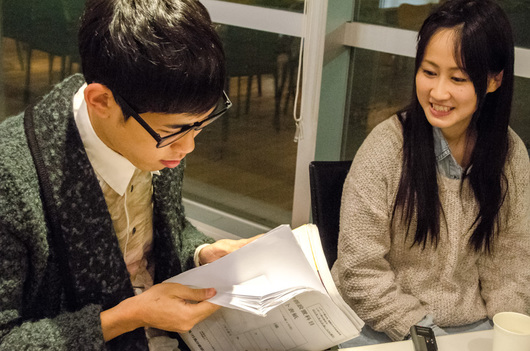
Q:Are there ways to enjoy idols without going to their live performances?
Daisuke:There are people who just watch them on television, of course. It's fun, in a different way.
Misaki: Sometimes, a bunch of us who like idols get together to watch idols' DVDs. It's at times like that that I feel grateful to the idols for bringing me close to my fellow fans.
Q:Why do you think idols are so popular?
Daisuke:That they lift us up, I think, is one reason. After the Great East Japan Earthquake, I was cooped up at home for about two weeks, unable to see my friends at school, and the TVonlyshowing footage of the tsunami. I was really overwhelmed, psychologically. And I honestly think I was able to get through that period because of idols. I mean, I was constantly watching video of Momoclo and Idoling!!! And I think that helped me maintain some semblance of emotional stability.
Misaki:I think one of the appeals is that as you go to live shows and buy CDs, idols become more and more famous.And you can feel as though you're somehow contributing to helping the idols develop and grow.
Daisuke:Actually, I have no sense that I'm helping idols "grow"... But it's definitely exciting to watch idols grow and change. For example, in 2011, a member of Momoclo who was in charge of MCing left the group, and I was worried what would happen to the remaining members... But at subsequent shows, the other members had clearly improved in their MC skills, almost making us forget that they were missing a member. We notice things like that!
(Interview by Tsuchiya Moe and Baba Tomomi, December 10, 2012)










